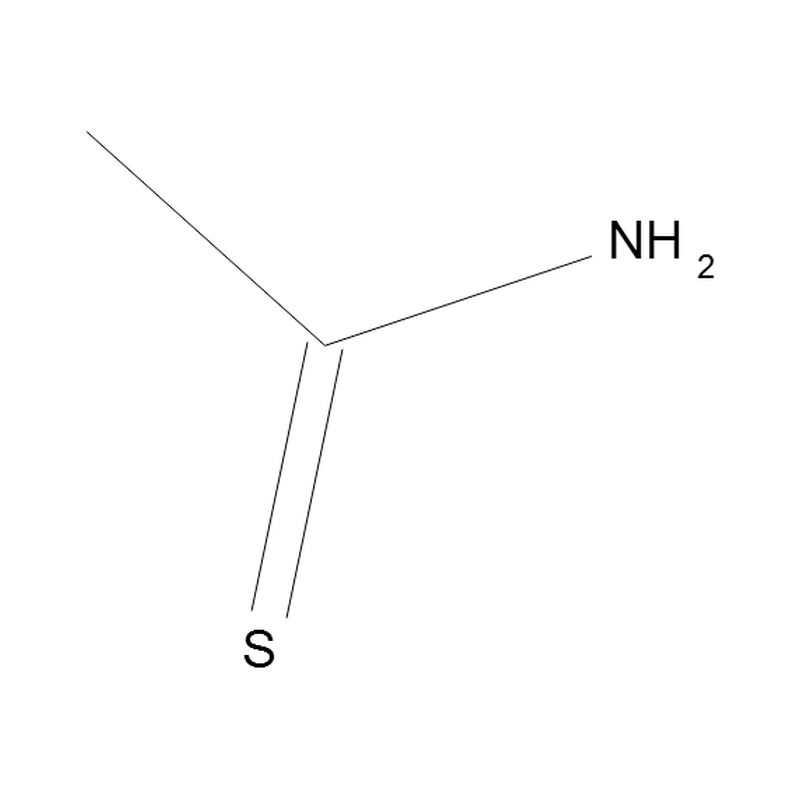产品
编 号:F409441
分子式:C2H5NS
分子量:75.13
分子式:C2H5NS
分子量:75.13
产品类型
规格
价格
是否有货
100mg
160
In-stock
500mg
240
In-stock
1g
320
In-stock
结构图

CAS No: 62-55-5
产品详情
生物活性:
Thioacetamide (TAA) is an indirect hepatotoxin and causes parenchymal cell necrosis. Thioacetamide requires metabolic activation by microsomal CYP2E1 to thioacetamide-S-oxide initially and then to thioacetamide-S-dioxide, which is a highly reactive metabolite, and its reactive metabolites covalently bind to proteins and lipids thereby causing oxidative stress and centrilobular necrosis. Thioacetamide can induce chronic liver fibrosis, encephalopathy and other events model.
体内研究:
Thioacetamide (TAA; 100 mg/kg; i.p.; three times weekly) can induce chronic liver fibrosis in male ICR mice.Thioacetamide (200-1200 mg/kg; i.p.; once) induces hepatic encephalopathy model in C57BL/6 mice.Animal Model:Male ICR mice
Dosage:100 mg/kg
Administration:Intraperitoneal injection; three times weekly for eight weeks
Result:Induced chronic liver fibrosis in male ICR mice and resulted in lower body weight, serum cholesterol and triglycerides as well as increased liver size, ALT, AST and LDH values.
Animal Model:Male C57BL/6 mice (20-25g, aged 8-12 weeks)
Dosage:200, 600, and 1,200 mg/kg
Administration:Intraperitoneal injection; once
Result:Altered the neuropsychiatric state, motor behavior and reflex and sensory functions.Increased in the glutamate release in the cerebral cortex of Hepatic encephalopathy (HE) mice.
体外研究:
Thioacetamide (TAA; 0-10000 μM; 24 h; WB-F344 cells) has cytotoxicity in a concentration-dependent manner.Thioacetamide (TAA; 1000 and 10000 μM; 0-24 h; WB-F344 cells) has differentially-expressed genes in the early phases at low (1000 μM) and high (10000 μM) concentrations.
Thioacetamide (TAA) is an indirect hepatotoxin and causes parenchymal cell necrosis. Thioacetamide requires metabolic activation by microsomal CYP2E1 to thioacetamide-S-oxide initially and then to thioacetamide-S-dioxide, which is a highly reactive metabolite, and its reactive metabolites covalently bind to proteins and lipids thereby causing oxidative stress and centrilobular necrosis. Thioacetamide can induce chronic liver fibrosis, encephalopathy and other events model.
体内研究:
Thioacetamide (TAA; 100 mg/kg; i.p.; three times weekly) can induce chronic liver fibrosis in male ICR mice.Thioacetamide (200-1200 mg/kg; i.p.; once) induces hepatic encephalopathy model in C57BL/6 mice.Animal Model:Male ICR mice
Dosage:100 mg/kg
Administration:Intraperitoneal injection; three times weekly for eight weeks
Result:Induced chronic liver fibrosis in male ICR mice and resulted in lower body weight, serum cholesterol and triglycerides as well as increased liver size, ALT, AST and LDH values.
Animal Model:Male C57BL/6 mice (20-25g, aged 8-12 weeks)
Dosage:200, 600, and 1,200 mg/kg
Administration:Intraperitoneal injection; once
Result:Altered the neuropsychiatric state, motor behavior and reflex and sensory functions.Increased in the glutamate release in the cerebral cortex of Hepatic encephalopathy (HE) mice.
体外研究:
Thioacetamide (TAA; 0-10000 μM; 24 h; WB-F344 cells) has cytotoxicity in a concentration-dependent manner.Thioacetamide (TAA; 1000 and 10000 μM; 0-24 h; WB-F344 cells) has differentially-expressed genes in the early phases at low (1000 μM) and high (10000 μM) concentrations.
产品资料

